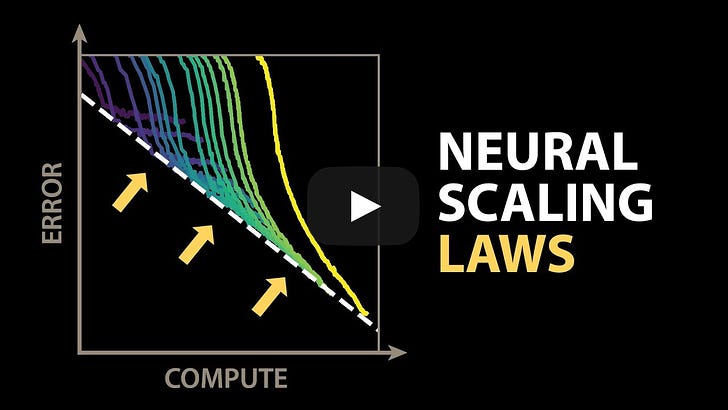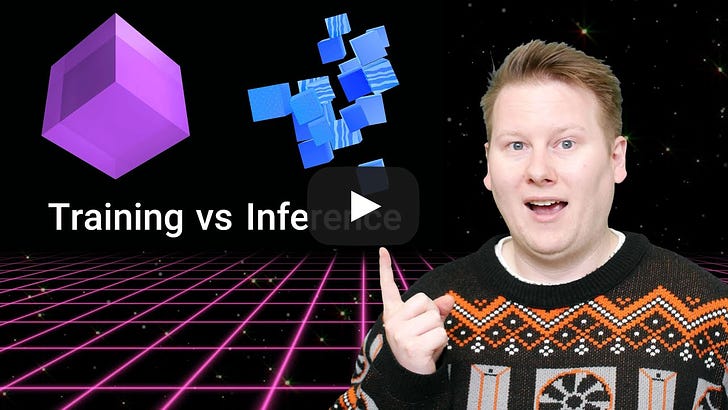From Oil to AI: The Middle East's Rise as a New AI and Tech Hub - Sync #485
I hope you enjoy this free post. If you do, please like ❤️ or share it, for example by forwarding this email to a friend or colleague. Writing this post took around eight hours to write. Liking or sharing it takes less than eight seconds and makes a huge difference. Thank you! From Oil to AI: The Middle East's Rise as a New AI and Tech Hub - Sync #485Plus: Google to flag AI-generated images; new AI laws in California; Cruise is back in Bay Area; drones to fly between hospitals in London; 23andMe independent board directors resigns; and more!Hello and welcome to Sync #485! The focus of this week’s issue of Sync is the recently announced investments and partnerships between the US and Gulf states in AI, which may turn the region into a new hub for AI and tech. In other news, Neuralink has received the FDA's breakthrough device tag for their implant aimed at restoring vision. Over in AI, Google will begin flagging AI-generated images in Search later this year, and California has passed new laws addressing deepfakes and actor clones. Meanwhile, OpenAI is threatening to ban users who probe too deeply into the inner workings of their latest model, o1. In robotics, Cruise robotaxis have returned to the Bay Area after a one-year exile, and drones will soon begin ferrying blood between two hospitals in London. We’ll conclude this week’s issue with news of a new open-source AI drug discovery system and the latest challenges facing 23andMe. Enjoy! From Oil to AI: The Middle East's Rise as a New AI and Tech HubOil has made Gulf states like the UAE and Saudi Arabia extremely wealthy in the 20th century. However, at some point, the last barrel of oil will be extracted, and the Gulf states are preparing to transition into their post-oil future by diversifying their economies. These countries have enormous resources, which they invest in becoming world centres for business, tourism, and culture. Additionally, they also aim to become hubs for tech startups and attract top talent to build companies there. Positioning as a world-class centre for AI companies is designed to help achieve this goal. These plans seem to be working, as they have already attracted the attention of both major companies and new players, seeking opportunities for investment or new partnerships worth billions of dollars. BlackRock and Microsoft to raise $30 billion for AI investmentsThis week, BlackRock and Microsoft announced partnership with the UAE's MGX investment vehicle to raise $30 billion in private equity for the development of AI-related data warehouses and energy infrastructure, with plans to leverage this to $100 billion in potential investments. The partnership, called the Global AI Infrastructure Investment Partnership, aims to meet the massive demand for data centers and AI infrastructure. The infrastructure investments will be mostly in the US, with a portion of the funds to be deployed in US partner countries. Key collaborators include Global Infrastructure Partners (being acquired by BlackRock for $12.5 billion) and Nvidia, which will contribute its expertise in AI data centers. Additionally, the companies will invest in expanding energy infrastructure, including renewable energy sources like solar and wind, to meet the growing demand for energy to run AI data centers. Microsoft’s partnership with G42 expandsThe partnership with BlackRock and MGX is not the only one Microsoft is involved in within the Middle East. The tech giant is also building on its existing $1.5 billion partnership with UAE-based AI firm G42 by opening two new AI centres in Abu Dhabi. The first, co-founded and co-funded by G42 and Microsoft, with the endorsement of Abu Dhabi’s Artificial Intelligence and Advanced Technology Council, will focus on developing best practices and industry standards for the responsible use of AI in the Middle East and the Global South. The second is the expansion of Microsoft’s AI for Good Research Lab into Abu Dhabi, which will support AI projects that address key societal goals. Groq and Saudi AramcoOther US companies are also looking at the Middle East for business partnerships. One of them is Groq, an AI chip startup, which signed an agreement with Saudi Aramco, the world’s largest oil company, to build the world’s largest inferencing data centre in Saudi Arabia using Groq’s Language Processing Units (LPUs). This data centre is expected to process billions of tokens per day by the end of 2024 and then increase the throughput to hundreds of billions of tokens per day by 2025. Middle East as a new AI and tech hubThese investments and partnerships signal an interesting trend in the global AI ecosystem. Currently, the field is dominated by the US and China, where most research, innovation, investment, and application of AI are concentrated. Now, a new tech hub in the Middle East is emerging, attracting billions of dollars in investments and the tech talent needed to build companies there. The recent partnerships are not just business deals—they also carry geopolitical implications. As tensions between the US and China grow, particularly in AI and tech, the US is leveraging these partnerships to strengthen ties with Middle Eastern tech ecosystems. By doing so, it seeks to counter China’s growing influence in AI across the Global South. Moreover, amid the geopolitical turbulence in the Middle East, these AI partnerships may also serve as a form of tech diplomacy, providing the US with alternative channels to influence regional politics. If you enjoy this post, please click the ❤️ button or share it. Do you like my work? Consider becoming a paying subscriber to support it For those who prefer to make a one-off donation, you can 'buy me a coffee' via Ko-fi. Every coffee bought is a generous support towards the work put into this newsletter. Your support, in any form, is deeply appreciated and goes a long way in keeping this newsletter alive and thriving. 🦾 More than a humanMusk's Neuralink gets FDA's breakthrough device tag for 'Blindsight' implant 🧠 Artificial IntelligenceOpenAI to Decide Which Backers to Let Into $6.5 Billion Funding Google will begin flagging AI-generated images in Search later this year California’s 5 new AI laws crack down on election deepfakes and actor clones Ban warnings fly as users dare to probe the “thoughts” of OpenAI’s latest model Will the "AI Scientist" Bring Anything to Science? Challengers Are Coming for Nvidia’s Crown Omnipresent AI cameras will ensure good behavior, says Larry Ellison Apple working on next-gen humanlike AI ‘personality’ that’s not Siri ▶️ AI can't cross this line and we don't know why. (24:06)  In this video, Welch Labs explains the neural scaling laws, which predict the improvements in the performance of neural networks as they scale up in size, data, and computational resources. It is one of the key concepts in modern deep learning, and it gave OpenAI the confidence to try training a truly large model that would eventually become GPT-3. I highly recommend this video if you are curious about how large language models work. ▶️ The Economics of AI are Failing, But We Can Fix It (With Lasers) (28:31)  Dr. Ian Cutress discusses the economic challenges of scaling AI and machine learning, focusing on large language models and the need to ensure profitability at every layer, from hardware to services. In this insightful analysis, he explores the future of the industry as models grow larger and more complex, with agentic workflows on the horizon. These models will require new levels of computing performance, pushing the industry to rethink how future AI supercomputers are built. Cutress suggests that traditional electrical connections may no longer suffice, and optical links could play a crucial role in enabling the high-speed data transfer necessary to support these large-scale AI systems efficiently. If you're enjoying the insights and perspectives shared in the Humanity Redefined newsletter, why not spread the word? 🤖 RoboticsCruise robotaxis return to the Bay Area nearly one year after pedestrian crash Face to face with Figure’s new humanoid robot Londoners will soon see drones ferrying blood between hospitals To be more useful, robots need to become lazier ▶️ Meet Isaac, the first robot assistant built for the home (0:32)  Weave Robotics is a startup that emerged seemingly out of nowhere, offering what they claim is the “world’s first personal robot built for the home.” As is typical for these kinds of startups, Weave has a sleek website and video where they present what their robot, Isaac, can do. And it can do a lot, from tidying up messes on floors and feeding pets to fetching drinks, food, and other items, according to Weave. The robot will cost $59,000, and the company is currently accepting $1,000 refundable deposits with first robots scheduled to be delivered in late 2025. I’m sceptical, but I will watch their progress with great interest. ▶️ The Carpentopod table being put to use! (0:17)  This is one of the most interesting robots I have seen in a while. My first thought when I saw it was, “It is a Strandbeest.” My second thought was, “It’s almost like Luggage from Discworld.” 🧬 Biotechnology23andMe independent board directors resign en masse OpenAI, Thrive Capital Back Six-Month-Old AI Drug Discovery Startup Where did viruses come from? AlphaFold and other AIs are finding answers Thanks for reading. If you enjoyed this post, please click the ❤️ button or share it. Humanity Redefined sheds light on the bleeding edge of technology and how advancements in AI, robotics, and biotech can usher in abundance, expand humanity's horizons, and redefine what it means to be human. A big thank you to my paid subscribers, to my Patrons: whmr, Florian, dux, Eric, Preppikoma and Andrew, and to everyone who supports my work on Ko-Fi. Thank you for the support! My DMs are open to all subscribers. Feel free to drop me a message, share feedback, or just say "hi!" |
Older messages
OpenAI Eyes a $150 Billion Valuation - Sync #484
Sunday, September 15, 2024
Plus: 60 countries endorsed a “blueprint” for military AI; Reflection 70B drama; "cyborg worms" controlled by AI; the feasibility of data centres in space; and more! ͏ ͏ ͏ ͏ ͏ ͏ ͏ ͏ ͏ ͏ ͏ ͏ ͏
Humanoid robots for factories and for homes - Sync #483
Saturday, September 7, 2024
Plus: new rumours about OpenAI's new models; DeepMind AlphaProteo; DIY, pirated medicine; OpenAI and Anthropic to share models with US government; and more! ͏ ͏ ͏ ͏ ͏ ͏ ͏ ͏ ͏ ͏ ͏ ͏ ͏ ͏ ͏ ͏ ͏ ͏ ͏ ͏
Hot (AI) Chips 2024 - Sync #482
Sunday, September 1, 2024
Plus: OpenAI Strawberry could be released this autumn; AGI safety and alignment at DeepMind; OpenAI in talks for another funding round; Chinese humanoid robots; Disney's dancing robot; and more! ͏
California's controversial AI bill - Sync #481
Friday, August 23, 2024
Plus: Neuralink shares a progress update on the second clinical trial; Windows Recall is coming back in October; a $16000 humanoid robot from Unitree; a lot about drones; and more! ͏ ͏ ͏ ͏ ͏ ͏ ͏ ͏ ͏ ͏
Google goes all in with Gemini - Weekly News Roundup - Issue #480
Tuesday, August 20, 2024
Plus: Grok-2; AI and BCI helps a person with ALS speak; Nvidia delays its new AI chips; new rumours about Apple's secret robotics project; drones to carry cargo missions in the Himalayas; and more!
You Might Also Like
Daily Coding Problem: Problem #1707 [Medium]
Monday, March 3, 2025
Daily Coding Problem Good morning! Here's your coding interview problem for today. This problem was asked by Facebook. In chess, the Elo rating system is used to calculate player strengths based on
Simplification Takes Courage & Perplexity introduces Comet
Monday, March 3, 2025
Elicit raises $22M Series A, Perplexity is working on an AI-powered browser, developing taste, and more in this week's issue of Creativerly. Creativerly Simplification Takes Courage &
Mapped | Which Countries Are Perceived as the Most Corrupt? 🌎
Monday, March 3, 2025
In this map, we visualize the Corruption Perceptions Index Score for countries around the world. View Online | Subscribe | Download Our App Presented by: Stay current on the latest money news that
The new tablet to beat
Monday, March 3, 2025
5 top MWC products; iPhone 16e hands-on📱; Solar-powered laptop -- ZDNET ZDNET Tech Today - US March 3, 2025 TCL Nxtpaper 11 tablet at CES The tablet that replaced my Kindle and iPad is finally getting
Import AI 402: Why NVIDIA beats AMD: vending machines vs superintelligence; harder BIG-Bench
Monday, March 3, 2025
What will machines name their first discoveries? ͏ ͏ ͏ ͏ ͏ ͏ ͏ ͏ ͏ ͏ ͏ ͏ ͏ ͏ ͏ ͏ ͏ ͏ ͏ ͏ ͏ ͏ ͏ ͏ ͏ ͏ ͏ ͏ ͏ ͏ ͏ ͏ ͏ ͏ ͏ ͏ ͏ ͏ ͏ ͏ ͏ ͏ ͏ ͏ ͏ ͏ ͏ ͏ ͏ ͏ ͏ ͏ ͏ ͏ ͏ ͏ ͏ ͏ ͏ ͏ ͏ ͏ ͏ ͏ ͏ ͏ ͏ ͏ ͏ ͏ ͏ ͏ ͏ ͏ ͏ ͏
GCP Newsletter #440
Monday, March 3, 2025
Welcome to issue #440 March 3rd, 2025 News LLM Official Blog Vertex AI Evaluate gen AI models with Vertex AI evaluation service and LLM comparator - Vertex AI evaluation service and LLM Comparator are
Apple Should Swap Out Siri with ChatGPT
Monday, March 3, 2025
Not forever, but for now. Until a new, better Siri is actually ready to roll — which may be *years* away... Apple Should Swap Out Siri with ChatGPT Not forever, but for now. Until a new, better Siri is
⚡ THN Weekly Recap: Alerts on Zero-Day Exploits, AI Breaches, and Crypto Heists
Monday, March 3, 2025
Get exclusive insights on cyber attacks—including expert analysis on zero-day exploits, AI breaches, and crypto hacks—in our free newsletter. ͏ ͏ ͏ ͏ ͏ ͏ ͏ ͏ ͏ ͏ ͏ ͏ ͏ ͏ ͏
⚙️ AI price war
Monday, March 3, 2025
Plus: The reality of LLM 'research'
Post from Syncfusion Blogs on 03/03/2025
Monday, March 3, 2025
New blogs from Syncfusion ® AI-Driven Natural Language Filtering in WPF DataGrid for Smarter Data Processing By Susmitha Sundar This blog explains how to add AI-driven natural language filtering in the






